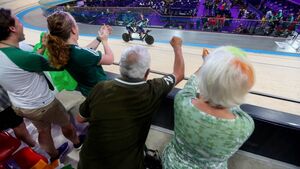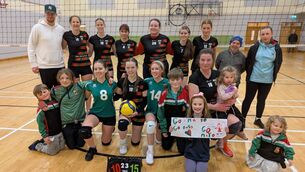Olympic funding is a win-win situation

John and Alana Dunlevy cheer on their daughter Katie-George and her pilot Eve McCrystal after their silver medal win in the Women's 'B' 3000m track cycling at the 2024 Paris Paralympic Games last Sunday. Picture: INPHO/Tom Maher
August may have turned to September and the schools are now back, but the manic sporting summer continues this week as the Paralympic Games unfold in Paris.
Coming so soon off the back of the Olympics, it’s another opportunity for talented athletes across a variety of different disciplines to showcase their skills and talents to a worldwide audience.
The Olympics provided Team Ireland with a real platform to show the depth of quality within the team – and they delivered in spades.
The medal haul of seven medals – four of them gold – represented a record for the country and reflected the improvement in standards across several sports.
Much has been made in the aftermath of the Olympics of the funding for Olympic sports, and sport in general, from central government.
The Olympics only come around every four years, so that is often the only time we see competitors in canoe slalom or table tennis or gymnastics on national television and in the media spotlight. Outside of that, it’s very much a niche area for many of the sports – and that means many struggle for funding from government to stay afloat, never mind thrive outside of the Olympic cycle.
I mention canoe slalom because that was one sport I got a huge insight to over the course of the Olympics. Liam Jegou, who spent part of his childhood in county Clare, came agonisingly close to a medal yet he represents a country where there is no custom-made facility to practice. There have been plans in the past to build a White Water Rafting Course at the IFSC in Dublin, but no progress has been made in recent years.
It’s just one example of many where extra resources, in some cases not costing too much in the wider scheme of things, could make a massive difference.
Off the back of the Games, Minister for Sport Thomas Byrne has said that funding for Irish athletes, and facilities, in advance of the next Olympics will top €500m. This breaks down, roughly, into €120m to support the athletes themselves and €400m then to be spent on stadiums and infrastructure.
Of course, the government has to be prudent when managing the public finances, but the Olympics just gone by underlined the importance of the nation competing – and winning – on the world stage.
Consider the widespread impact of the Olympics.
It’s something that captures the imagination of the whole country, irrespective of people’s interests in specific sports or not. Viewers will tune to watch the Olympics, even if they have no clue about what a certain sport entails. And if there’s Irish interest in that particular discipline, the athlete in question will receive widespread support from the country at large.
Consider the scenes when Irish athletes did come good to land a medal – for me, Mona McSharry’s success in the pool was the best of them all.
“I’m still that little girl from Sligo,” she said in the aftermath. How many more little girls around the country will take inspiration from the exploits of the Grange swimmer in the years ahead?
When you see the feel-good factor created by Irish success on the global stage, it’s hard to see why the government would not invest more heavily in supporting our athletes and creating a really good sporting culture across all of the disciplines. The return on that investment would be worth it and would be met with, I think, a favourable response by the taxpayers whose money would be going towards that cause.
The benefits include, you would hope, even more success on the Olympic stage in the years ahead and that can lend itself to helping stimulate more interest in sports that might be considered niche or minority at present. The many, many benefits then that the state may accrue in having more people involved in physical activity as a result of being inspired and motivated by more athletes competing on the world stage will create lasting, tangible benefits in so many areas down the line.
It’s hard to see a negative!
Our Paralympics team is also full of talented athletes, many of whom have overcome serious obstacles to take their place in Paris. There are high hopes, with some of the more optimistic predictions suggesting Ireland could take eight medals over the course of the ten days in Paris.
Speaking of inspiration, the Paralympic athletes provide it in bucket loads. When you look at what many of the athletes have to do just to be able to participate in sport, not to mind at such a high level as the Paralympics, it’s hard not to admire their persistence and attitude to achieve their goals.
The ability of the Paralympics to give hope is unmatched.
An excerpt from a piece in the by Afghan swimmer Abbas Karimi helps emphasise just what a powerful tool sport can be.
“I was born in Afghanistan with no arms,” he wrote around the time of the Winter Games in 2022.
“As a child, while my family supported me, the world around me did not. I was seven when this realisation hit me – my life was going to be different. I was bullied at school and made to feel inferior. It was only when I discovered swimming that I finally felt accepted.
“The water made me feel safe and it was swimming that made me feel alive; it also made me realise that even with my disability, I had a gift. That’s when I set out on a journey that would break down barriers and show others that people with disabilities can be active and fulfil their potential.”
If you haven’t already, it’s worth tuning into the Paralympics over the coming days to see what sport really is all about.




